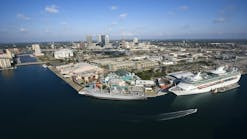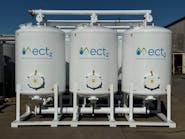On March 7, 2023, EPA held an informational webinar covering the Build America, Buy America Act and its requirements for water infrastructure projects.
The U.S. EPA’s Office of Water held an informational webinar on implementation of the Build America, Buy America (BABA) Act for water equipment manufacturers, suppliers and distributors on March 7, 2023.
An overview of the webinar’s information is provided in this article.
BABA, generally
BABA was created through the Bipartisan Infrastructure Law on Nov. 15, 2021. It is a domestic preference law that applies to all federal financial assistance programs and went into effect on May 14, 2022.
The law specifically states that “none of the funds made available for a Federal financial assistance program for infrastructure, including each deficient program, may be obligated for a project unless all of the iron, steel, manufactured products, and construction materials used in the project are produced in the United States.”
This means that water infrastructure projects receiving any type of federal funding, including funding from State Revolving Funds, will likely need to comply with BABA’s requirements.
What BABA covers
The act specifically covers three categories of items in a project:
- Iron and steel
- Manufactured products
- Construction materials (non-ferrous)
This applies only to items consumed in, incorporated into, or affixed to a project. Any single item can only be classified into one of these three categories.
Iron and steel
This includes items that are primarily or predominantly iron or steel, unless another standard applies under law or regulation.
For iron and steel, all manufacturing processes, from the initial melting stage through the application of coatings, must occur in the U.S.
Manufactured products
For manufactured products, BABA requires that final manufacturing must take place in the U.S. and that a majority of the product’s components are acquired in the U.S.
The component requirements are specifically that more than 55% of the cost of a product’s components must be mined, produced, or manufactured in the U.S.
Construction materials (non-ferrous)
This third category covers construction materials that are not part of the iron and steel category, including:
- Non-ferrous metals,
- Plastic and polymer-based products,
- Glass,
- Lumber, and
- Drywall
The webinar took care to note that this section specifically excludes the following materials:
- Primarily iron or steel products,
- Manufactured products,
- Cement and cementitious materials,
- Aggregates,
- Aggregate binding agents, and
- Flora
American Iron and Steel
BABA contains many similarities and overlaps with another domestic preference law, the American Iron and Steel (AIS) provision, which was passed into law in 2014.
AIS requires the use of iron and steel products that are produced in the U.S. for the construction, alteration, maintenance, or repair of a public water system or treatment works. It overlaps with BABA’s iron and steel product category.
“There’s going to be an interaction of AIS and BABA requirements for projects as new financial assistance awards are issued,” said Leslie Corcelli, a physical scientist at EPA, during the webinar.
Thankfully, if a program meets BABA requirements, it also meets AIS requirements.
“AIS and BABA iron and steel products are, by definition, the same thing” said Timothy Connor, a chemical engineer of water infrastructure for EPA, during the webinar.
Certification and waivers
To comply with BABA, each product used in a project will need a corresponding certification letter from the manufacturer or EPA-issued waiver.
“If you receive a product and don’t receive a certification letter . . . then the recipient should be in contact with the supplier, distributor or manufacturer to procure a certification letter,” said Connor.
A certification letter is provided by a product manufacturer. To be valid, the letter must have five key elements:
- A reference to the project,
- A specific list of the products covered in the letter,
- The location of where the products were manufactured (city, state),
- A reference to compliance to AIS or BABA, and
- A signature of the manufacturer representative
A letter of certification can contain multiple products. If different products were manufactured in different locations, the letter will need to address each location.
A certification for BABA compliance can be used as certification for AIS compliance and vice versa, but only for iron and steel products.
Waivers, however, cannot be pursued by manufacturers. Project-specific waiver requests must be sent by the community or funding recipient to the state.
Seeking comments
EPA is currently seeking comments on two aspects of BABA: how the agency will determine the cost of components, and a minor components product waiver.
The agency is seeking comments on guidance for determining the cost of components for manufactured products, which is an important part of determining BABA compliance. The agency is looking for feedback on multiple specific questions, which can be found here.
The agency is soliciting public comments through Monday, March 13, 2023.
“We are bringing this solicitation of public comment to your attention and note the opportunity for you, the manufacturing community, to bring issues of concern relevant to your operations and sectors to the attention of the Made in America Office,” said Dan-Tam Nguyen, an environmental engineer for EPA, during the webinar.
Comments can be submitted to EPA through the Federal Register.
EPA is also currently exploring broad product-specific non availability waivers for BABA, to allow for the use of products not currently manufactured in the U.S.
“We are researching complex manufacturing products that need more time to be made in the US” said Jessica Habashy, an environmental engineer for EPA. “They will be temporary, targeted, and short-term.”
BABA resources
EPA has two key sources for information on BABA: an initial guidance document published on April 18, 2022, and a supplemental document published on Nov. 3, 2022.
The first guidance document is available online as a 17-page document titled “Initial Implementation Guidance on Application of Buy America Preference in Federal Financial Assistance Programs for Infrastructure.”
The second supplemental document is available online as a 23-page document titled “Build America, Buy America Act Implementation Procedures for EPA Office of Water Federal Financial Assistance Programs.”
EPA also has two main contacts for questions about BABA or AIS compliance: [email protected] and [email protected].




